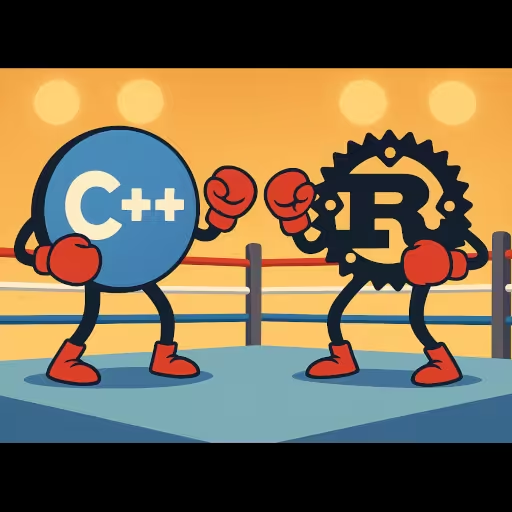C++ Programming Language History and Overview
The following is a summary of a C++ history video on YouTube titled "The Untold Story of C++".
Please check out CodeSource's channel to watch more insightful videos on tech and coding.
History of C++ Video Summary
C++ quietly surpassed Java to become the third most popular programming language in late 2022 and reached second place behind Python by 2024, according to the TIOBE rankings. Unlike Python's or JavaScript's rise, C++'s growth went largely unnoticed by the mainstream, but it has remained crucial behind the scenes for decades—powering servers, game engines, vehicles, and embedded systems.
C++ originated at Bell Labs in the late 1970s when Bjarne Stroustrup needed a language that could handle simulations with both speed and abstraction. By grafting object-oriented features onto C (first called "C with classes," then "C++"), he created a language that could handle large, complex systems efficiently.
Throughout the 1980s and 1990s, C++ became widespread in industry and academia, despite (and partly because of) its complexity. The lack of early standardization led to fragmentation, but eventually, the ISO C++ standard stabilized the language. C++ powered major software from operating systems to 3D games, and despite its power, it demanded great responsibility from developers—manual memory management, pointer arithmetic, and the potential for bugs like memory leaks.
Some prominent developers, including Linus Torvalds and Donald Knuth, were critical of C++'s complexity and risk of abstraction, but C++'s adoption grew, especially in performance-critical fields like finance, gaming, and embedded systems.
As newer programming languages like Java, Python, and Rust rose to prominence (in the 90s and 2000s), C++ was sometimes seen as outdated. But major C++ updates (C++11, C++14, C++17, C++20) brought modern features—lambdas, smart pointers, multi-threading, modules—making it safer and more expressive while keeping its unmatched speed and power.
By the 2020s, C++ remained deeply embedded in the world's technological infrastructure—databases, browsers, AI libraries, and more. While debates about safety and complexity persist, and memory-safe languages are being promoted, C++ continues to evolve and maintain its essential role in high-performance and system-critical software.
What is the C++ Programming Language Used For?
It's used for almost anything where low-level memory management, and efficiency is of upmost importance!
C++ is everywhere under the hood, especially in the highest performance, cross-platform, or infrastructure layers. Many of the most popular languages, frameworks, browsers, media tools, databases, and even AI frameworks rely on C++ for speed-critical or "close to the metal" parts.
Where is C++ Used in Industry?
C++ is often used to compile or run other languages, to compile browsers, and to do heavy CPU- or GPU-intensive tasks, like video rendering and 3D modeling or rendering. Here's a short, but not exhaustive, list where C++ often gets used.
1. Programming Languages & Runtimes
- Python: The CPython interpreter (what almost everyone uses) is C, but major packages like NumPy, SciPy, TensorFlow, and PyTorch use C++ for heavy lifting.
JavaScript Engines:
- V8 (used by Chrome and Node.js): C++
- SpiderMonkey (Firefox): C++
- JavaScriptCore (Safari): C++
Other Languages:
- Ruby: Core interpreter is C, but "YARV" VM, and many gems (like Nokogiri) use C++ extensions.
- PHP: Zend Engine (C), but many extensions in C/C++.
- R: Core is C, but many statistical/matrix libraries in C++.
2. Browsers
Google Chrome:
- Blink rendering engine: C++
- V8 JavaScript engine: C++
Mozilla Firefox:
- Gecko rendering engine: C++
- SpiderMonkey JS engine: C++
Safari:
- WebKit rendering engine: C++
- JavaScriptCore: C++
3. Media, Video, and Audio Processing
FFmpeg: Written in C, but a lot of codecs/libs (and forks, like libav) include heavy C++ use*.
- Used by VLC, YouTube, Twitch, many video editors, web browsers.
OpenCV:
- Computer vision and image processing, all C++ core (Python bindings are wrappers).
OBS Studio:
- Streaming, recording—primarily C++.
Blender:
- Major open-source 3D modeling/rendering app—C, C++.
libVLC:
- The engine behind VLC Media Player—C/C++, with wrappers for many languages.
4. Databases
- MySQL: Core engine is C++, storage engines like InnoDB are C++.
- PostgreSQL: Core is C, but major extensions, and some drivers, are C++.
- MongoDB: Entirely C++ core engine.
- LevelDB: Google's high-performance key-value store—C++.
5. Operating Systems & Kernel Modules
- Windows: Many subsystems and core libraries are C++.
- macOS/iOS: Core frameworks (CoreFoundation, CoreGraphics) are C/C++/Objective-C++.
- Linux: Kernel is C, but userland and many drivers/libs are C++.
6. Game Engines
- Unreal Engine: C++ (entire engine, game logic).
- Unity: Engine core in C++, scripting in C#.
- Godot: C++ engine core, scripting in GDScript/C#.
- CryEngine, Source Engine, Frostbite, IdTech: All C++.
7. AI/ML Frameworks
- TensorFlow: - C++ backend (Python API is a thin layer).
- PyTorch: "LibTorch" backend is C++.
- ONNX Runtime: High-performance inference engine, C++.
- XGBoost, LightGBM: C++ cores.
8. Networking, Compression, Security
- OpenSSL: C, but many wrappers/extensions in C++.
- libcurl: C, but C++ wrappers everywhere.
- Boost.Asio: High-performance networking—pure C++.
- Zlib, Brotli, LZ4, etc.: C, C++.
9. Scientific and Numeric Libraries
- Eigen: High-performance linear algebra—C++.
- Armadillo: Linear algebra—C++.
- Blas/Lapack: C/Fortran, but all major bindings and wrappers often use C++.
10. Mobile App Stacks
- Android: Core system libs and many high-performance apps use C++ with JNI bindings.
- iOS: Objective-C++ allows C++ in core libraries and frameworks.
11. Other Applications Created in C++
- Qt: The entire UI/app framework (used by KDE, many cross-platform apps)—C++.
- wxWidgets: C++.
- Autodesk software, Photoshop, Office, etc.: Large portions in C++.
- Docker: Many container engines and plugins written in C++ or Go (which itself links to C++ libs).
TL;DR: Why Is C++ the Engine Under the Hood?
- Performance: As fast as C, with modern abstractions.
- Portability: Cross-platform with mature compilers for every major OS.
- Ecosystem: Decades of highly optimized, battle-tested libraries (see above).
- Interop: Easy to create bindings/wrappers for Python, Java, .NET, etc.
- Memory Control: Manual management means you can squeeze out every drop of perf—at the cost of more bugs if you're not careful.
Advantages of 'C++' Over 'C'
C++ builds directly on top of the C language, retaining its low-level performance while introducing powerful new features that make programming safer, more efficient, and more expressive. One of the biggest advantages of C++ over C is its support for object-oriented programming (OOP). With features like classes, inheritance, and polymorphism, C++ allows developers to organize code around reusable objects, leading to cleaner, more maintainable, and scalable software compared to the purely procedural approach of C.
Another major benefit is stronger type safety and abstraction. C++ offers function overloading, default arguments, namespaces, and templates, allowing code to be more generic, expressive, and less error-prone. Features like references, the Standard Template Library (STL), and smart pointers help prevent common bugs found in C, such as buffer overflows and memory leaks.
C++ also introduces modern programming conveniences such as exception handling, operator overloading, and advanced memory management through constructors, destructors, and RAII (Resource Acquisition Is Initialization). These features help developers write robust code that is both efficient and easier to debug. Additionally, C++ code can often be seamlessly mixed with C libraries, so developers can leverage existing codebases while gaining the productivity advantages of modern C++.
In summary, C++ extends C with tools that improve code organization, reliability, and development speed, making it the preferred choice for large, complex, or performance-critical software projects.
Is Rust Better Than C++?
There's no simple yes/no answer—it depends entirely on your goals, project, and constraints. But here's a direct summary:
In what ways is Rust "better" than C++?
- Memory Safety: Rust makes whole classes of bugs (buffer overflows, use-after-free, double free) almost impossible by enforcing strict ownership and borrowing rules at compile time. C++ still relies on developer discipline for this.
- Concurrency: Rust's type system catches data races at compile time, so multi-threaded code is safer by default.
- Modern Language Features: Rust's error handling (Result, Option) is less error-prone than C++ exceptions or raw return codes.
- Zero-cost Abstractions: Rust matches C++'s "don't pay for what you don't use" performance, but with safer syntax and less boilerplate.
- Package Ecosystem: Rust's package manager (Cargo) is more modern and user-friendly than C++'s fragmented build ecosystem.
- Better Defaults: Rust encourages best practices out of the box (e.g., immutability, explicit lifetimes, no nulls).
Why Continue to Use C++ Rather Than Rust?
- Maturity: C++ has a massive ecosystem, 40+ years of libraries, tools, and highly optimized code for almost every domain.
- Performance: Both can be equally fast, but C++ has more "bare metal" escape hatches and more battle-tested compilers/optimizations.
- Industry Adoption: Most large legacy projects, embedded systems, and game engines are in C++. Finding C++ talent, support, or libraries is easier in many industries.
- Interoperability: C++ is the lingua franca for high-performance, cross-platform code; integrating with other languages and platforms is often simpler.
Why Use Rust Over C++
1. Memory safety by default:
Rust all but eliminates entire classes of bugs (use-after-free, buffer overflows, null pointer dereferencing) thanks to its strict ownership and borrowing model. In C++, these errors are common and often subtle, especially in large or complex projects.
2. Safer concurrency:
Rust's type system ensures that data races are caught at compile time, not at runtime. Writing safe multi-threaded code in C++ is possible, but much harder and riskier.
3. Simpler error handling:
Rust uses Result and Option types instead of error codes or exceptions, making error handling explicit and less prone to being ignored.
4. Modern tooling and workflow:
Rust's toolchain (Cargo, rustfmt, clippy, etc.) is consistent, fast, and integrated. C++ build systems and dependency management (CMake, make, vcpkg, Conan, etc.) are fragmented and often painful for newcomers.
5. Zero-cost abstractions:
Rust gives you modern, high-level abstractions (iterators, traits, generics) that compile down to code as fast as hand-written C++. You don't pay for what you don't use.
6. Strong developer experience:
Compiler errors are famously helpful, and the community emphasizes clear, high-quality documentation and learning resources.
7. Fewer "footguns":
Rust is designed to make the "safe" path the easy/default path, whereas C++ gives you both powerful tools and dangerous sharp edges with little guidance.
In short:
Choose Rust over C++ if you want modern productivity, built-in safety, and a much lower risk of critical bugs—especially in new codebases, security-sensitive applications, or when concurrency is a focus.
Will C++ Ever Be Memory Safe Like Rust?
Direct answer:
No, C++ will never be "memory safe" in the way Rust is—at least not by default, and not without breaking massive amounts of legacy code and core language principles. Here's the skeptical, engineering-focused reasoning:
1. C++'s Core Identity = "Zero Cost Abstractions" + Full Control
- C++ gives you manual memory control: Pointers, raw allocation, unchecked dereferencing, type punning, reinterpret_cast, manual lifetimes, etc.
- Rust's safety is enforced at compile time via ownership, borrowing, and strict rules that simply do not (and cannot) exist in C++ without breaking almost all major codebases.
- C++ standards committee is extremely conservative: They prioritize not breaking 40+ years of legacy code and ABI compatibility.
2. Making C++ "Memory Safe" Would Break... Everything
- Pointer arithmetic, manual new/delete, casting, "placement new," C-style arrays, and a million other patterns are the C++ ecosystem.
- Remove or restrict these and you can't run the Linux kernel, Unreal Engine, DB engines, drivers, or almost any system-level C++ code.
- Safety requires restrictions. Those restrictions are fundamentally incompatible with C++'s promise to "let you do anything if you know what you're doing."
3. What C++ Is Doing Instead
- Guidelines and best practices: The C++ Core Guidelines (led by Stroustrup & co.) recommend safer patterns, e.g., always use std::unique_ptr/std::shared_ptr, avoid naked new/delete.
- Static analyzers: Tools like Clang Static Analyzer, AddressSanitizer, MSVC's code analysis, etc., can catch many classes of bugs—but optionally, and not enforced by the language.
- Library-level safety: The STL and modern libraries try to avoid unsafe APIs by default, but can't prevent the developer from "unsafe" code if they want it.
- Safer defaults (in the future): Some talk of making unsafe features more "opt-in," but this is politically and technically hard.
4. The Rust Difference
- Rust's safety comes from making things impossible to do unsafely without explicit opt-in.
C++ is the opposite: "Everything is possible, and you're responsible."
- Rust's approach requires breaking code: Rust succeeded because it had no legacy baggage; C++ has to maintain decades of critical infrastructure.
5. Will C++ Ever Get a Rust-Like "Safe Subset"?
- Possible: There are efforts (like "Lifetime Profiles" in future C++ standards, or "checked pointers" in MSVC), and you can voluntarily write in a safe subset.
- But: The language itself will always keep its full power for backward compatibility and systems work.
6. What Will Happen Instead?
- C++ will gradually get safer defaults, better libraries, and more tools—but it will always allow unsafe code for those who want or need it.
- Rust (or a language like it) will increasingly be used for new safety-critical, security-focused, and embedded projects, but C++ will remain for huge swathes of legacy and performance-critical infrastructure.
TL;DR of Memory Safety in C++
- No, C++ can't be "memory safe" like Rust without fundamentally breaking what makes it C++.
- Best case: C++ will encourage memory-safe patterns and give you tools, but "unsafe" will always be an option.
- For true safety, use Rust (or Zig, or future new languages) for greenfield projects. For legacy or maximal performance, C++ will always exist—danger and all.
Conclusion
C++ has a storied history, evolving from a powerful extension of C into a modern programming language at the core of today's technology infrastructure. While newer languages like Rust offer built-in memory safety and modern tooling, C++ continues to dominate in fields where performance, control, and ecosystem maturity are non-negotiable. Major updates over the past decade have kept C++ relevant, introducing features that make development safer and more productive while maintaining its unmatched speed. Whether you're building operating systems, high-performance libraries, or game engines, understanding C++—and when to choose it over other languages—remains an invaluable skill for any serious developer.












